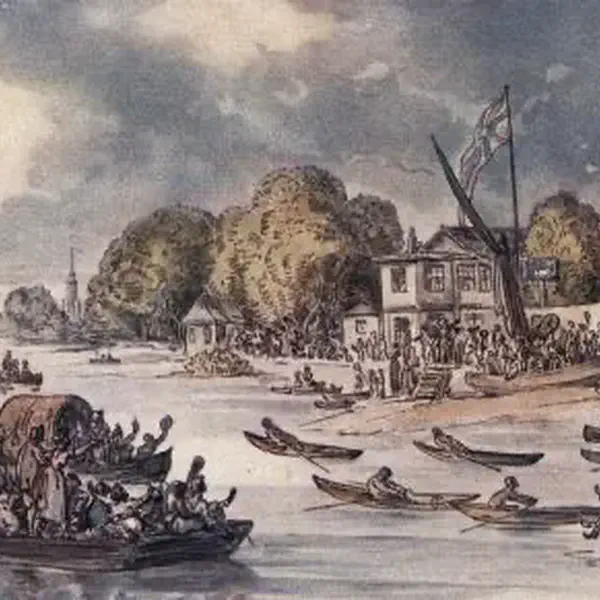
The First Doggett Coat and Badge Sculling Race Takes Place on the Thames
April 01, 1716
Doggett’s Coat and Badge is the prize and name for the oldest continuous rowing race in the world. Up to six apprentice watermen of the River Thames in England compete for this prestigious honour, which has been held every year since 1715. The 4 mile 5 furlongs (7.44 km) race is rowed on the River Thames upstream from London Bridge to Cadogan Pier, Chelsea, passing under a total of eleven bridges. Originally, it was raced every 1 August against the outgoing (falling or ebb) tide, in the boats used by watermen to ferry passengers across the Thames.
Today it is raced at a time amenable to spectators, in September, that coincides with the incoming (rising or flood) tide, in contemporary single sculling boats.
History
Thomas Doggett was an Irish actor and comedian who became joint manager of Drury Lane Theatre. He relied heavily upon the watermen of the Thames, who were then the equivalent of the modern taxi driver, to convey him between the various plying stairs near his workplaces in the City of London and his residence in Chelsea. There is a legend that in 1715 Doggett was rescued by a waterman after falling overboard whilst crossing the Thames near Embankment.
Although this has always been dismissed, along with other myths, by the Fishmongers’ Company, the story continues that in gratitude for his rescue he offered a rowing wager to the fastest of six young watermen in their first year of freedom, over the course between “The Swan” pub at London Bridge and “The Swan” pub at Chelsea.
Rowing wagers were common in those days, but this one was unique: Doggett set the wager to be a traditional red watermens’ coat, but, being a “great Whig in Politics”, Doggett arranged the race for 1 August each year, and had the coat furnished with a silver badge “representing Liberty”, to commemorate the accession to the throne on 1 August 1714 of George I of the House of Hanover. The current badge prominently features both the word “Liberty” and an image of the horse, an emblem of the House of Hanover.
The race was organised and financed by Doggett each year from 1715 until his death in 1721. In his will, Doggett left specific instructions for the continuation of the race, which is now held by the Fishmongers’ Company, a livery company of the City of London.